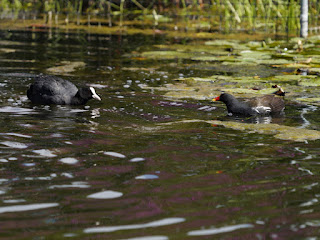The small birds were keeping in cover, and there was only a distant glimpse of a Long-Tailed Tit in a holly tree.
It took three visits to Buck Hill to find the young Little Owl.
Jackdaws have taken over the nest hole once used by the Little Owls near the leaf yard.
A Great Crested Grebe chick kept cool in the shade of the willow near the bridge.
A Moorhen and a Coot had a tense faceoff in the Italian Garden. The Moorhen has a nest with chicks in one of the planters, and the Coot objects to it.
Seen from the bridge, a Mute Swan flew down the Long Water. They either have to haul themselves up to fly over the bridge, or splash down before they reach it and swim underneath. They won't fly under the arches, understandably as they are big and not at all manouevrable in the air.
The Black Swan extended its remarkably long neck to drink from the Serpentine.
A young Egyptian Goose enjoyed a splashy wash.
A shoal of young Common Carp about 3 inches long whisked around in the Italian Garden fountain.
The Small Red-Eyes Damselflies in the next pool had all decided to mate at once, somehow managing to fight at the same time.
An unusual picture by Mark Williams of a pair of butterflies mating. I think they must be Small Whites, but their position hides their markings.
A large hornet-mimicking hoverfly, Volucella zonaria, in the shrubbery at the foot of Buck Hill.
The wildflower patch at the back of the Lido hasn't done at all well this year, but it has managed to produce just one red poppy.
Finally, something really exotic. Martin Sacks sent this picture of a Fischer's Turaco (Tauraco fischeri), an East African bird, which has been living in West Hampstead Cemetery for the past two years. It makes strange froglike calls. It's not an escape from Regent's Park Zoo and no one knows where it has come from.













Must be lonely, that Turaco.
ReplyDeleteAnd not a banana plant in sight.
Deleteoh I don't know, you do find them in gardens; likely no ripe fruit, though.
DeleteI wish we could get to know how a turaco managed to find itself in West Hampstead Cemetery. At least it seems to be doing well out of its habitat.
ReplyDeleteThe Black Swan's neck is absolutely astonishing.
They have 24 cervical vertebrae.
DeleteSwan chiropractors would make a killing...
DeleteI think swans' necks are better designed than ours.
DeleteThat turaco is a smart bird. I have seen a few species in Africa but don't think I've seen this one. amazing it's survived our winters though the last one was mild.
ReplyDeleteI wonder if you have just the one poppy because the soil wasn't tilled? Being annuals they need soil disturbance.
Nice shot of V. zonaria. I've only seen one so far. Normally get quite a few sightings in the garden. I think it may be due to the paucity of social wasps, though I did see one of the latter by my pond yesterday evening.
The soil was rotavated. I think they started the wildflower patch much too late, and possibly tried to save money by buying a cheaper seed mixture -- seeds of the more desirable wildflowers can be gravely expensive.
DeleteThat's the first hoverfly of that species I've seen in the park (or anywhere). It may be coincidental, but this place is where true hornets are most often seen.
there were regular reports of turaco on Wanstead Common up to a couple of years ago on London Bird Wiki . Mark W2
ReplyDeleteThat's a long way from Hampstead. What fun if this is the beginning of a feral population. (But probably they said the same thing about the first Kingston parakeets.)
Deletehahaah. that would be great! they are v beautiful birds. at waddesdon Manor (the Rothschild mansion in Bucks) has a collection. even further I guess Mark W2
DeleteIt was a White-cheeked Turaco reported on the wiki in the Wanstead area for about 8 years. Jim
DeleteMissed walking the parks...but thanks Ralph for the beaytiful blogs of pics and videos...
ReplyDeleteHibernating from the heat ...
Will resume my love of creation and nature walks pretty soon..
The pics of small white butterflies and the exotic east african bird are truly awesome...
Looks like all the creatures seem to thrive on hearwave in UK...
Including this creature. In the words of Noel Coward, Mad dogs and Englishmen go out in the midday sun.
Delete